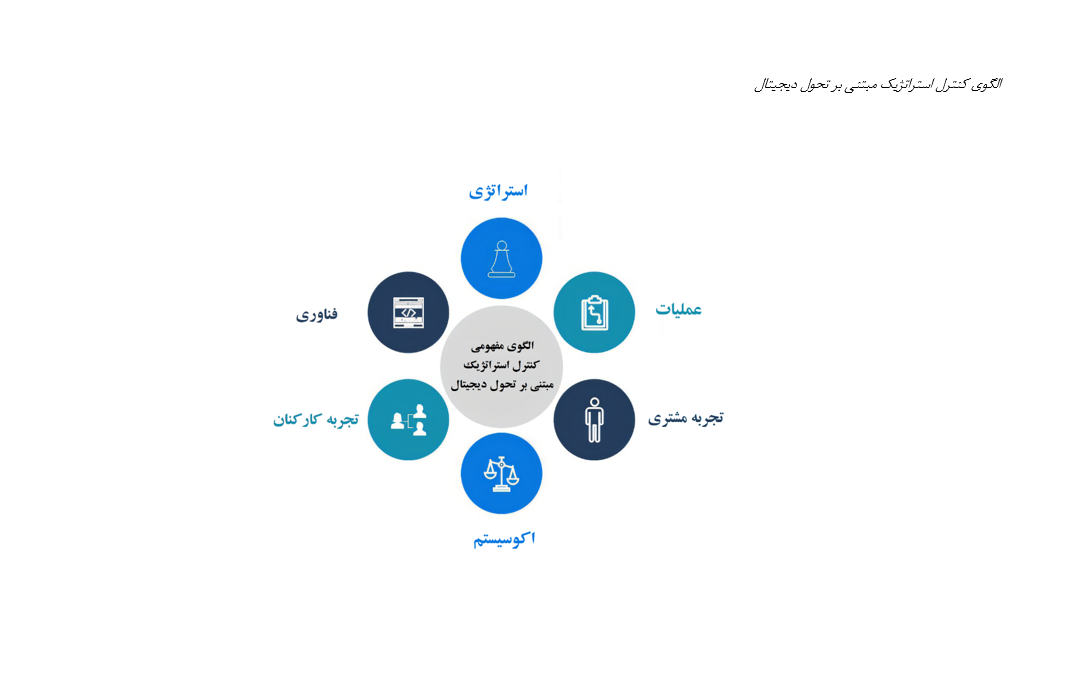الگوی کنترل استراتژیک مبتنی بر تحول دیجیتال
کلمات کلیدی:
کنترل استراتژیک, تحول دیجیتال , استراتژی, دیجیتالچکیده
کنترل استراتژیک یکی از مهمترین پاسخهای مدیریت به بحران ها و پویایی محیطی است. آشفتگی محیطی به دلیل افزایش شدید سطوح رقابت پذیری، وجود بازارهای بی ثبات و افزایش پیچیدگی محیطی است. مهمترین اثر این آشفتگی، تشدید عدم قطعیت و دشواری شرکتها در پیشبینی متغیرهای اصلی محیطی است. در سالهای اخیر، یک انقلاب صنعتی (Industry 4.0) مرتبط با تمام ابعاد کسب و کارها به وقوع پیوسته است که ریشه در تحول دیجیتال دارد. از آنجایی که این تحول بر تصمیمگیری استراتژیک در زمینههای مختلف ازجمله تجربه مشتری، فرایندهای عملیاتی و مدل کسب و کار اثر می گذارد، نیاز به ابزارهای مدیریت استراتژیک جدید را آشکار میکند. بنابراین لازم است فرصتها و خطرات دگرگونی دیجیتال مدیریت شده و از قابلیت ها و ابزارهای آن برای بازنگری استراتژی به منظور کنترل استراتژیک مبتنی تحولات دیجیتال ارائه شود. ابتدا ادبیات نظری مرتبط با کنترل استراتژیک و 14 الگوی کنترل استراتژیک که به ابعاد کنترل پرداختهاند را مرور کرده و بر اساس این 14 الگو، تعداد 18 مولفه کنترل استراتژیک را شناسایی کردیم. سپس به تحول دیجیتال، تعاریف و ابعاد آن پرداخته و بر اساس 13مدل برگزیده در موضوع تحول دیجیتال، 6 بعد اصلی را شناسایی کردیم و در نهایت، با استفاده از روش فراترکیب، مولفه های 18 گانه کنترل استراتژیک را در 6 بعد تحول دیجیتال شناساییشده، دسته بندی نموده و الگوی کنترل استراتژیک مبتنی بر تحول دیجیتال را معرفی نمودیم.
دانلودها
مراجع
Abdul, B. (2024). Assessing the Impact of Employee-Centric Digital Transformation Initiatives on Job Performance: The Mediating Role of Digital Empowerment. Strategic Management, 29(2), 5-18. https://doi.org/10.5937/straman2300057r
Adebayo, A. O., Chaubey, M. S., & Numbu, L. P. (2019). Industry 4.0: The Fourth Industrial Revolution And How It Relates To The Application Of Internet Of Things (IoT). J. Multidiscip. Eng. Sci. Stud, 5, 2478. https://www.researchgate.net/publication/331533011_Industry_40_The_Fourth_Industrial_Revolution_And_How_It_Relates_To_The_Application_Of_Internet_Of_ThingsIoT
Agrawal, A., Schaefer, S., & Funke, T. (2018). Incorporating Industry 4.0 in corporate strategy. In Analyzing the impacts of Industry 4.0 in modern business environments (pp. 161-176). IGI Global. https://doi.org/10.4018/978-1-5225-3468-6.ch009
Attaran, M., & Woods, J. (2019). Cloud computing technology: improving small business performance using the Internet. Journal of Small Business & Entrepreneurship, 31(6), 495-519. https://doi.org/10.1080/08276331.2018.1466850
Dumay, J., & Cai, L. (2015). Using content analysis as a research methodology for investigating intellectual capital disclosure: A critique. Journal of Intellectual Capital, 16(1), 121-155. https://doi.org/10.1108/JIC-04-2014-0043
Hafeznia, M. (2019). An Introduction to Research Methods in Humanities. SAMT (Organization for Research and Composing University Textbooks in the Humanities).
Joel, O. S. (2024). Navigating the Digital Transformation Journey: Strategies for Startup Growth and Innovation in the Digital Era. International Journal of Management & Entrepreneurship Research, 6(3), 697-706. https://doi.org/10.51594/ijmer.v6i3.881
Khashaei, V. (2015). Presenting a Classified Model of Strategic Control Tools. Strategic Management Thought Quarterly, 17. https://ensani.ir/fa/article/352578/
Kuteesa, K. N. (2024). Navigating the Digital Transformation Journey: Strategies for Startup Growth and Innovation in the Digital Era. International Journal of Scholarly Research in Multidisciplinary Studies, 4(2), 038-053. https://doi.org/10.56781/ijsrms.2024.4.2.0031
Liu, S. (2024). Study on the Impact of Digital Transformation on Green Total Factor Productivity. Frontiers in Business Economics and Management, 15(2), 331-334. https://doi.org/10.54097/rqfvs751
Liu, X. (2024). Why Do Employees (Not) Support Enterprise Digital Transformation? A Transactional Theory of Stress Perspective. Group & Organization Management. https://doi.org/10.1177/10596011241301811
Mehrkam, M., & Nasimi, Z. (2024). The Impact of Managerial Leadership Styles on Digital Transformation in the National Tax Administration. Smart Business Management Studies, 13(50), 263-297.
Mohammadpour, A. (2011). Meta-Methodology: Philosophical and Practical Foundations of Mixed-Method Research in Social and Behavioral Sciences (Third Edition). Sociologists' Publications.
Nabiyi, F., Shami Zanjani, M., & Garoosi Mokhtar Zadeh, N. (2024). Explaining and Developing the Content Dimensions of Digital Transformation Strategy. Strategic Management Studies Quarterly, 15(60), 23-47.
Nasih, M. Z. (2024). Digital Transformation: The Effect of Learning Management Systems in Developing Employee Digital Competence. Jurnal Ekonomi Bisnis & Entrepreneurship, 18(2), 604-613. https://doi.org/10.55208/z4bv1w35
Oberländer, A. M. (2024). Understanding the Influence of Digital Ecosystems on Digital Transformation: The OCO (Orientation, Cooperation, Orchestration) Theory. Information Systems Journal, 35(1), 368-413. https://doi.org/10.1111/isj.12539
Oliinyk, M. (2024). Digital Transformation of Management Processes in State and Public Organizations: Features, Directions, and Recommendations for Development. Management and Entrepreneurship Trends of Development, 1(27), 53-63. https://doi.org/10.26661/2522-1566/2024-1/27-05
Onesi-Ozigagun, O. (2024). Leading Digital Transformation in Non-Digital Sectors: A Strategic Review. International Journal of Management & Entrepreneurship Research, 6(4), 1157-1175. https://doi.org/10.51594/ijmer.v6i4.1005
Prado, L. S. D. (2024). BRK: Digital Transformation to Delight Consumers. Cadernos Ebape Br, 22(2). https://doi.org/10.1590/1679-395120230171x
Rahman Seresht, H., & Harandi, A. (2017a). Examining the Effect of Strategic Control of Corporate Governance on the Effective Leadership of Listed Companies in the Stock Exchange. Business Management, 9(3), 485-506. https://jibm.ut.ac.ir/article_63840.html?lang=en
Rahman Seresht, H., & Harandi, A. (2017b). A Model for Strategic Control of Corporate Governance Using the Classical Grounded Theory Strategy. Public Management Research, 10(37), 29-58. https://jmr.usb.ac.ir/article_3677.html?lang=en
Sarmad, Z., Bazargan, A., & Hejazi, E. (2019). Research Methods in Behavioral Sciences. Agah Publishing.
Wahyono, T. (2024). Digital Transformation in MSMEs in Indonesia: The Importance of Commitment to Change. International Journal of Social Service and Research, 4(01), 378-384. https://doi.org/10.46799/ijssr.v4i01.703
Zhang, Y. (2024). Mechanisms of the Impact of Enterprise Digital Transformation on Knowledge Sharing Behavior of Employees. 1(3), 309-318. https://doi.org/10.62517/jmsd.202412343
Zhang, Y. (2024). The Successful Factors for Digital Transformation in Project Management. Advances in Economics Management and Political Sciences, 79(1), 297-303. https://doi.org/10.54254/2754-1169/79/20241858
Zhou, W. (2024). Mechanisms Influencing the Digital Transformation Performance of Local Governments: Evidence From China. Systems, 12(1), 30. https://doi.org/10.3390/systems12010030

دانلود
چاپ شده
ارسال
بازنگری
پذیرش
شماره
نوع مقاله
مجوز
حق نشر 2025 Rahim Zare; Mojtaba AbedianKhorasani, Vahid Khashei Varnamkhasti, Mehdi Haghighi Kaffash (Author)

این پروژه تحت مجوز بین المللی Creative Commons Attribution-NonCommercial 4.0 می باشد.










